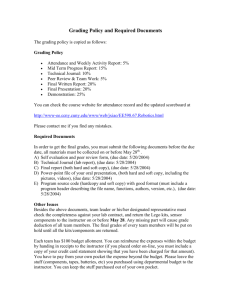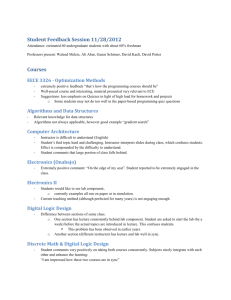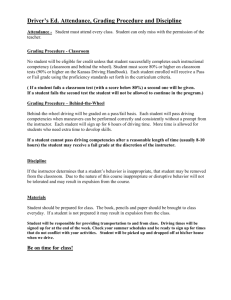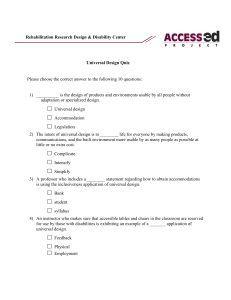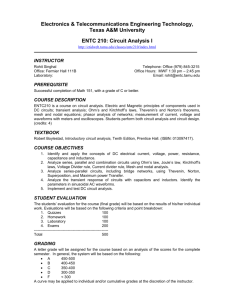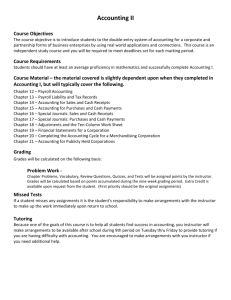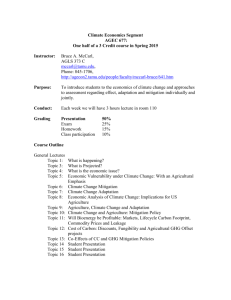Word Document
advertisement
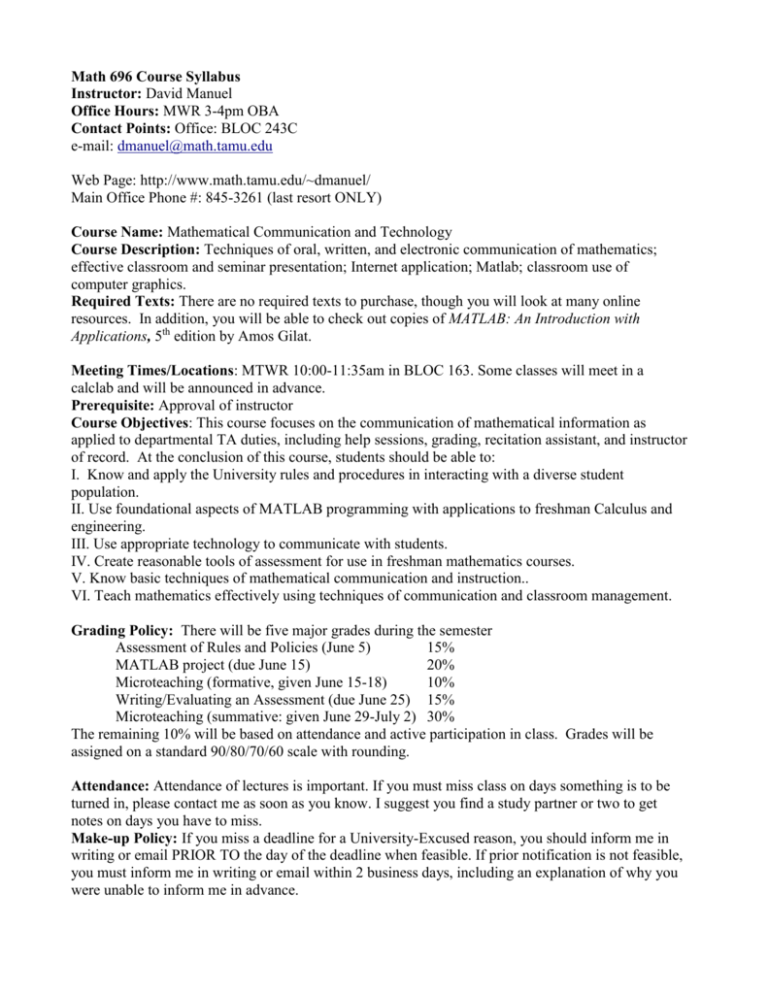
Math 696 Course Syllabus Instructor: David Manuel Office Hours: MWR 3-4pm OBA Contact Points: Office: BLOC 243C e-mail: dmanuel@math.tamu.edu Web Page: http://www.math.tamu.edu/~dmanuel/ Main Office Phone #: 845-3261 (last resort ONLY) Course Name: Mathematical Communication and Technology Course Description: Techniques of oral, written, and electronic communication of mathematics; effective classroom and seminar presentation; Internet application; Matlab; classroom use of computer graphics. Required Texts: There are no required texts to purchase, though you will look at many online resources. In addition, you will be able to check out copies of MATLAB: An Introduction with Applications, 5th edition by Amos Gilat. Meeting Times/Locations: MTWR 10:00-11:35am in BLOC 163. Some classes will meet in a calclab and will be announced in advance. Prerequisite: Approval of instructor Course Objectives: This course focuses on the communication of mathematical information as applied to departmental TA duties, including help sessions, grading, recitation assistant, and instructor of record. At the conclusion of this course, students should be able to: I. Know and apply the University rules and procedures in interacting with a diverse student population. II. Use foundational aspects of MATLAB programming with applications to freshman Calculus and engineering. III. Use appropriate technology to communicate with students. IV. Create reasonable tools of assessment for use in freshman mathematics courses. V. Know basic techniques of mathematical communication and instruction.. VI. Teach mathematics effectively using techniques of communication and classroom management. Grading Policy: There will be five major grades during the semester Assessment of Rules and Policies (June 5) 15% MATLAB project (due June 15) 20% Microteaching (formative, given June 15-18) 10% Writing/Evaluating an Assessment (due June 25) 15% Microteaching (summative: given June 29-July 2) 30% The remaining 10% will be based on attendance and active participation in class. Grades will be assigned on a standard 90/80/70/60 scale with rounding. Attendance: Attendance of lectures is important. If you must miss class on days something is to be turned in, please contact me as soon as you know. I suggest you find a study partner or two to get notes on days you have to miss. Make-up Policy: If you miss a deadline for a University-Excused reason, you should inform me in writing or email PRIOR TO the day of the deadline when feasible. If prior notification is not feasible, you must inform me in writing or email within 2 business days, including an explanation of why you were unable to inform me in advance. Scholastic Dishonesty: Remember the Aggie Code of Honor: An Aggie does not lie, cheat, or steal, or tolerate those who do! Each student is responsible for submitting their own unique work. On each project, you are not allowed to receive any kind of assistance from anyone other than the instructor or TA. Any instance of scholastic dishonesty will be handled according to the processes outlined on the Honor Code website at http://aggiehonor.tamu.edu/Faculty/WhatToDo.aspx . Expectations: I expect you to attend and actively participate in class discussions and to treat me and your classmates with respect. You can expect me to be prompt and consistent in grading and treat you with respect. Weekly Schedule: Week of June 2-5 Week of June 8-12 Week of June 15-19 Week of June 22-26 Week of June 29-July 3 University Rules and Policies; Help Sessions; Grading; Recitations Classroom Technology; MATLAB; Effective Communication; Working with Diverse Student Populations Microteaching Lessons (Formative) Instructor of Record; Syllabus; Assessments; Classroom Management Microteaching Lessons (Summative) Disabilities: The Americans with Disabilities Act (ADA) is a federal anti-discrimination statute that provides comprehensive civil rights protection for persons with disabilities. Among other things, this legislation requires that all students with disabilities be guaranteed a learning environment that provides for reasonable accommodation of their disabilities. If you believe you have a disability requiring an accommodation, please contact Disability Services, in Cain Hall, Room B118, or call 845-1637. For additional information visit http://disability.tamu.edu Copyright Statement: All printed handouts and web-materials are protected by US Copyright Laws. No multiple copies can be made without written permission by the instructor. Detailed Course Objectives: This course focuses on the communication of mathematical information as applied to departmental TA duties, including help sessions, grading, recitation assistant, and instructor of record. At the conclusion of this course, students should be able to: I. Know and apply the University rules and procedures in interacting with a diverse student population. A. FERPA as applied to grading, recitation, and Instructor of Record B. Student Attendance and Make-up Procedures C. Accommodating Students with Disabilities D. Handling cases of Scholastic Dishonesty II. Use foundational aspects of MATLAB programming with applications to freshman Calculus and engineering. III. Use appropriate technology to communicate with students. A. Designing an effective course web page B. Tools to communicate with students outside of the classroom 1. E-Campus 2. WebAssign (online HW program) 3. Howdy/Class email C. Tools to communicate with students within the classroom 1. SMART Notebook (lecture notes) 2. TI-Smartview (Graphing Calculator simulator) 3. iClickers for large classes IV. Create reasonable tools of assessment for use in freshman mathematics courses. A. Designing quizzes at an appropriate level B. Alternative Assessments V. Know basic techniques of mathematical communication and instruction. A. Addressing different student learning styles B. Creating relevant and/or interesting examples C. Striking a balance: formal definitions vs. intuitive concepts VI. Teach mathematics effectively using techniques of communication and classroom management. A. Setting the tone: first day of teaching your own class B. Effectively managing classroom disturbances/distractions C. Creating interactive lessons D. Availability outside of class
